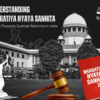No products in the cart.
In The Field Of Civil Law In India, One Of The Most Significant Judgments Delivered In Recent Months Was The Supreme Court’s Decision In Vijay Kumar Sharma V. Union Of India (2023). This Case Involved Issues Related To The Interpretation Of Contractual Obligations, Property Rights, And Consumer Protection Laws, And It Has Broad Implications For Various Civil Law Disputes In India.
The Case Primarily Centered Around The Rights Of Individuals And Businesses Under Contract Law And The Application Of Statutory Regulations When Agreements Involve Both Private Parties And Public Entities.
Case Overview
The Petitioner, Vijay Kumar Sharma, A Businessman, Had Entered Into A Contract With A Public-Sector Entity Under The Public Procurement Act. However, Due To Regulatory Delays And Non-Fulfillment Of Obligations By The Government Department, Sharma Sought To Invoke Damages For The Breach Of Contract And Non-Payment Of Dues, Arguing That He Was Entitled To Compensation For The Inconvenience Caused By The Delay. The Case Brought Into Question How Civil Contracts Should Be Enforced When One Party To The Contract Is A Government Entity.
The Primary Issue Before The Supreme Court Was Whether The Petitioner Could Claim Damages For The Delay And If The Government Departments Could Be Held Liable For Breaching Contractual Obligations, Especially In Light Of Statutory Immunity Often Provided To Government Bodies Under Indian Law.
Key Highlights Of The Judgment :
- Clarification Of Government Liability In Civil Contracts
The Supreme Court Made An Important Distinction Between Private Contractual Relationships And Those Involving Government Agencies. While The Court Recognized That Government Entities Can Be Held Liable For Breaches Of Contracts, It Also Emphasized That The Sovereign Immunity Doctrine Still Applies In Certain Contexts, Particularly When The Breach Arises Out Of Acts Of Policy, Regulatory Delays, Or Circumstances Beyond The Control Of The Public Entity.
- Statutory Framework Governing Public Contracts
The Judgment Reinforced That Public Contracts In India Are Subject To A Statutory Framework That Is More Rigorous Than Typical Civil Contracts. The Court Held That In Public Contracts, There Is A Higher Standard Of Transparency And Accountability Required From Government Departments, But It Also Reiterated That These Contracts Are Governed By Specific Legal Provisions, Such As The Public Procurement Act And Government Contracts Act, Which May Limit The Extent To Which A Private Party Can Claim Damages In The Event Of A Breach.
- Consumer Protection In Civil Disputes
A Significant Aspect Of The Judgment Was The Court’s Consideration Of How Consumer Protection Laws Should Apply In Cases Involving Civil Disputes. The Court Noted That The Consumer Protection Act, 2019, Especially In Its Provisions Regarding Unfair Trade Practices, Might Be Invoked By Individuals And Businesses Involved In Contractual Relationships With Government Bodies If Their Interests Are Adversely Affected. This Expands The Scope Of Consumer Rights, Even In The Context Of Public Procurement.
- Principle Of ‘Reasonable Delay’ In Civil Contracts
The Supreme Court Laid Down The Principle Of Reasonable Delay In The Context Of Civil Contracts, Particularly When The Delay Is Caused By Factors That Are Beyond The Control Of One Party. In This Case, The Court Ruled That While Delays In Government-Related Matters Are Common, It Is Essential For The Aggrieved Party To Demonstrate That The Delay Was Not Justifiable, And If So, They Could Be Entitled To Compensation. The Judgment Helped Establish The Importance Of Timely Performance In Contractual Obligations, Especially For Government Departments.
- Stronger Enforcement Of Contractual Rights
Another Noteworthy Part Of The Judgment Was The Court’s Emphasis On Enforcing Contractual Obligations, Even When One Party Is A Public Institution. The Court Reiterated That The Freedom Of Contract Should Be Respected, And That Parties To The Contract—Whether Governmental Or Private—Must Adhere To The Agreed Terms, Failing Which, The Aggrieved Party Is Entitled To Seek Appropriate Remedies, Including Damages Or Specific Performance, In Accordance With The Indian Contract Act, 1872.
- Impact On Public Procurement Laws
The Judgment Has A Broad Impact On How Public Procurement Contracts Are Handled In India. The Court Ruled That Delays Or Breaches By Government Agencies In The Fulfillment Of Their Contractual Obligations Could Lead To Compensation Claims Or The Termination Of The Contract, Strengthening The Position Of Private Parties In Dealing With The Government. This Is Particularly Important In Infrastructure Projects And Public-Private Partnerships, Where Private Companies Often Enter Into Agreements With Government Bodies.
Broader Implications For Civil Law In India
- Strengthening Consumer And Contractual Rights
The Ruling Reaffirms The Importance Of Enforcing Contracts And Protecting Consumer Rights In Civil Law Disputes. It Holds That Even When The Government Is A Party To The Contract, It Must Fulfill Its Obligations And Can Be Held Accountable For Breaches, Ensuring That Individuals And Businesses Are Not Disadvantaged.
- Clarity On Government Liability
The Judgment Provides Greater Clarity On The Liability Of Government Agencies In Contractual Matters. By Distinguishing Between Policy-Driven Delays And Those Caused By Administrative Inefficiency Or Wrongful Acts, The Court Has Created A More Predictable Environment For Businesses Dealing With Public Entities.
- Public Procurement Reforms
The Ruling Could Lead To Important Reforms In Public Procurement Laws, As It Calls For Greater Accountability And Transparency. Government Bodies May Now Be More Inclined To Fulfill Their Contractual Obligations In A Timely And Efficient Manner To Avoid Legal Challenges.
- Expansion Of Consumer Protection
The Judgment Indicates A Growing Recognition Of Consumer Rights, Even In The Realm Of Civil Disputes Involving Public Bodies. This Ensures That Individuals And Entities Engaging In Contractual Relationships With Government Departments Are Provided With Protections Akin To Those Under The Consumer Protection Act.
Conclusion
The Vijay Kumar Sharma V. Union Of India Judgment Of 2023 Marks An Important Shift In The Realm Of Civil Law In India, Particularly In The Context Of Government Contracts And Consumer Protection. The Ruling Strengthens The Contractual Rights Of Individuals And Businesses, Clarifies The Liability Of Government Agencies In The Case Of Breaches, And Emphasizes The Need For Greater Transparency And Accountability In Public Procurement.
As Public Procurement And Government Contracts Continue To Play A Significant Role In India’s Economic Landscape, This Judgment Will Likely Influence Future Disputes, Leading To Better Enforcement Of Contracts And Improved Protection For Businesses And Consumers Alike.
Related posts
In The Evolving Landscape Of Matrimonial Law In India, One Of The Most Significant Recent Judgments Is From 2023, Where The Supreme Court Of India... Continue reading











Add comment